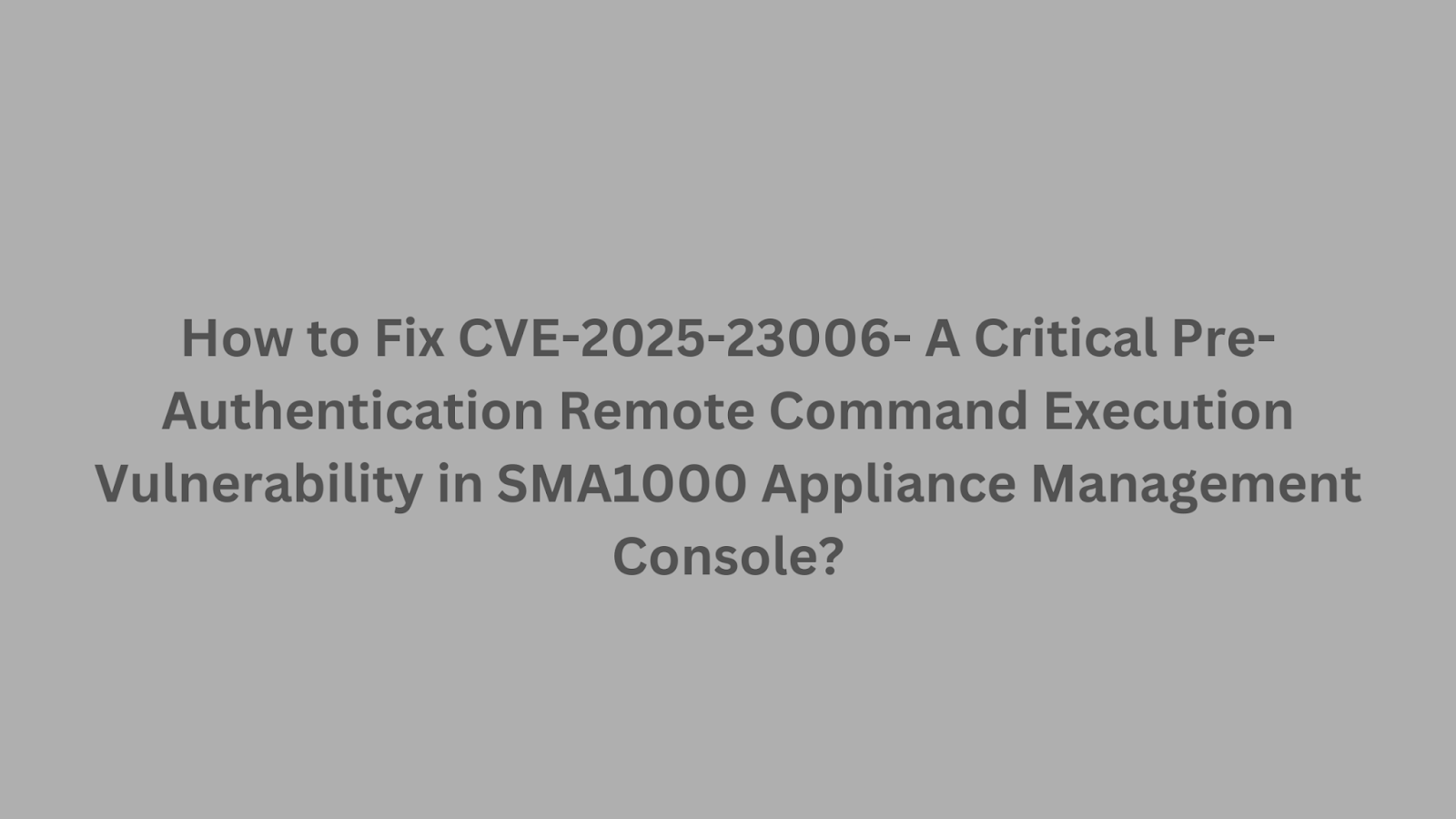Table of Contents
How to Fix CVE-2025-23006- A Critical Pre-Authentication Remote Command Execution Vulnerability in SMA1000 Appliance Management Console?
In the ever-evolving landscape of cybersecurity, a critical vulnerability has emerged that demands immediate attention from security professionals. SonicWall has disclosed a severe pre-authentication remote command execution vulnerability in its Secure Mobile Access (SMA) 1000 Series appliances, tracked as CVE-2025-23006. With a maximum CVSS score of 9.8, this vulnerability represents a significant threat to organizations using the SMA1000 Appliance Management Console (AMC) and Central Management Console (CMC).
The vulnerability allows remote, unauthenticated attackers to potentially execute arbitrary OS commands under specific conditions, creating a critical security risk for enterprises relying on SonicWall's secure access solutions. Given the potential for active exploitation, immediate action is crucial to protect organizational infrastructure.
Introduction to SonicWall SMA1000 Appliance
SonicWall Secure Mobile Access (SMA) 1000 Series is a unified secure access gateway designed for large distributed enterprises. The appliance provides secure remote access solutions, enabling employees to access applications from anywhere while maintaining robust security controls. Key features include:
Secure remote access management
User authentication and authorization
Centralized access control
Support for distributed enterprise environments
Summary of the Vulnerability
CVE ID: CVE-2025-23006
Description: Pre-authentication deserialization of untrusted data vulnerability in SMA1000 Appliance Management Console
CVSS Score: 9.8
CVSS Vector: CVSS:3.0/AV:N/AC:L/PR:N/UI:N/S:U/C:H/I:H/A:H
The vulnerability stems from improper deserialization of untrusted data in the SMA1000 management consoles. This flaw could potentially enable a remote unauthenticated attacker to execute arbitrary OS commands under specific conditions.
Impact of the Vulnerability
The potential impact of CVE-2025-23006 is severe and far-reaching. Successful exploitation could allow attackers to:
Execute arbitrary commands on the underlying operating system
Gain unauthorized access to critical network infrastructure
Compromise sensitive organizational data
Potentially use the compromised system as a launching point for further network infiltration
The Microsoft Threat Intelligence Center (MSTIC) has confirmed possible active exploitation, heightening the urgency for remediation.
Products Affected by the Vulnerability
|
Product
|
Affected Versions
|
Status
|
|---|---|---|
|
SMA1000 Appliance Management Console
|
Version 12.4.3-02804 (platform-hotfix) and earlier
|
Vulnerable
|
|
SMA1000 Central Management Console
|
Version 12.4.3-02804 (platform-hotfix) and earlier
|
Vulnerable
|
Important Notes:
SonicWall Firewall products are NOT affected
SMA 100 series products are NOT affected
How to Check Your Product is Vulnerable?
Check the current software version in the management interface
Verify if the version is 12.4.3-02804 or earlier
Confirm the NX-API feature is enabled
Review network logs for suspicious access attempts
Use vulnerability scanning tools to detect potential exploitation
How to Fix the Vulnerabilities?
Primary Remediation Strategy
Upgrade Immediately:
Update to Cisco SSM On-Prem version 12.4.3-02854 (platform-hotfix) or later
Download from official SonicWall support portal
Follow vendor-provided upgrade instructions carefully
Recommended Mitigation Steps
Network Segmentation
Restrict access to the Appliance Management Console
Implement strict firewall rules
Use VPN or dedicated management networks
2. Access Control
Limit administrative access
Implement multi-factor authentication
Review and restrict user permissions
3. Monitoring and Logging
Enable comprehensive logging
Set up real-time alerts for suspicious activities
Regularly review authentication logs
Workarounds
If immediate patching is not possible:
Restrict AMC and CMC access to trusted sources only
Disable unnecessary network services
Implement additional network-level protection mechanisms
Conclusion
CVE-2025-23006 represents a critical security vulnerability that requires immediate attention. Security professionals must prioritize upgrading their SMA1000 appliances and implementing comprehensive mitigation strategies to protect their organizational infrastructure.
Proactive security measures, timely patching, and continuous monitoring are essential in mitigating risks associated with such critical vulnerabilities. Understanding the CVSS score is important for the security professional. This vulnerability is a type of remote code execution, and it's crucial to know the basics of Linux operating system as well. Organizations should have a proper cyber incident response plan to handle such vulnerabilities.
Found this article interesting? Keep visit thesecmaster.com, and our social media page on Facebook, LinkedIn, Twitter, Telegram, Tumblr, Medium, and Instagram and subscribe to receive tips like this.
You may also like these articles:
Arun KL
Arun KL is a cybersecurity professional with 15+ years of experience in IT infrastructure, cloud security, vulnerability management, Penetration Testing, security operations, and incident response. He is adept at designing and implementing robust security solutions to safeguard systems and data. Arun holds multiple industry certifications including CCNA, CCNA Security, RHCE, CEH, and AWS Security.
